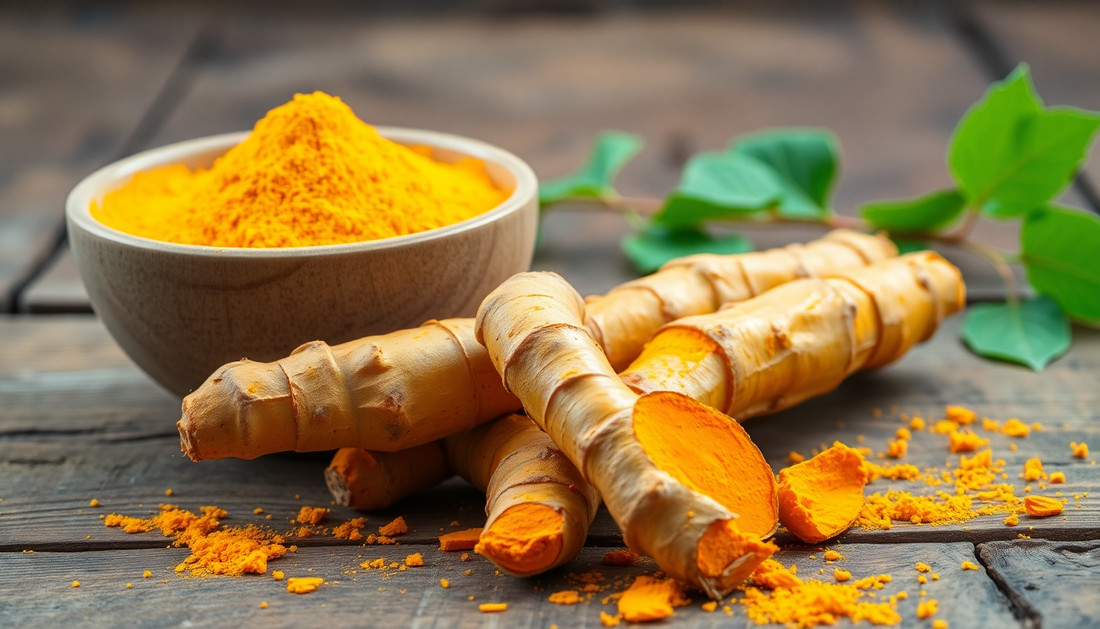
Turmeric: A Natural Remedy for Inflammation Management
Share
Turmeric: Nature’s Solution for Combating Inflammation
In today’s fast-paced world, inflammation affects millions globally, contributing to discomfort and increasing the risk of chronic diseases. From persistent joint pain to digestive disorders and cardiovascular concerns, managing inflammation is key to maintaining health. Fortunately, nature offers an effective remedy: turmeric.
Turmeric, derived from the rhizome of the Curcuma longa plant, has long been a staple in traditional medicine and Indian cuisine. Its active compound, curcumin, has been extensively studied for its powerful anti-inflammatory and antioxidant properties.
Understanding Inflammation: A Double-Edged Sword
Inflammation is the body’s natural defense mechanism, essential for healing injuries and fighting infections. However, when inflammation becomes chronic, it can lead to numerous health issues.
Types of Inflammation
- Acute Inflammation: A short-term response to injury or infection, characterized by redness, swelling, and pain.
- Chronic Inflammation: Persistent, low-grade inflammation lasting months or years, linked to conditions such as arthritis, inflammatory bowel diseases, and cardiovascular disease (Harvard Health).
Common Causes of Chronic Inflammation
- Poor diet
- Stress
- Sedentary lifestyle
- Exposure to environmental toxins (NIH)
Addressing these root causes is crucial for preventing chronic inflammation and promoting long-term health.
Turmeric: A Natural Anti-Inflammatory Powerhouse
Turmeric has been revered in Ayurvedic and traditional Chinese medicine for centuries. Its active compound, curcumin, modulates the body’s inflammatory response by inhibiting key inflammatory molecules like cytokines and prostaglandins (PubMed).
How Curcumin Works
- Inhibits Inflammatory Enzymes: Blocks cyclooxygenase-2 (COX-2) and lipoxygenase activity.
- Modulates Gene Expression: Reduces the expression of genes associated with inflammation.
- Neutralizes Free Radicals: Acts as a potent antioxidant to reduce oxidative stress (JAMA).
Curcumin offers a natural alternative to over-the-counter anti-inflammatory medications, often associated with adverse side effects during long-term use.
Scientific Evidence: Turmeric’s Anti-Inflammatory Impact
Extensive research supports turmeric’s effectiveness in managing inflammation and related health conditions:
-
Arthritis
A study in the Journal of the American College of Nutrition found that curcumin was as effective as ibuprofen in reducing pain and improving joint function in individuals with osteoarthritis (NIH). -
Inflammatory Bowel Diseases
Research published in Phytotherapy Research demonstrated that curcumin reduced inflammation and improved symptoms in patients with ulcerative colitis and Crohn’s disease (PubMed). -
Cardiovascular Health
Chronic inflammation is a risk factor for heart disease. Curcumin improves endothelial function, lowers cholesterol levels, and reduces markers of inflammation, enhancing overall cardiovascular health (BMJ).
Incorporating Turmeric into Your Lifestyle
Adding turmeric to your routine is a simple and effective way to harness its benefits:
Dietary Sources
- Use fresh turmeric root or ground turmeric powder in curries, soups, smoothies, and teas.
- Combine turmeric with black pepper to enhance curcumin absorption.
Supplements
- High-quality turmeric supplements with standardized curcumin extracts are available for concentrated doses.
- Look for formulations that include piperine, an active compound in black pepper, to improve bioavailability (Cleveland Clinic).
Recommended Dosage
- Typical dosages range from 500 to 2,000 mg of curcumin per day, divided into multiple doses. Adjust based on individual health needs and conditions (Mayo Clinic).
Precautions and Potential Side Effects
While turmeric is generally safe, high doses of curcumin may cause:
- Gastrointestinal discomfort (e.g., nausea, diarrhea).
- Interactions with medications such as blood thinners, NSAIDs, or diabetes drugs (PubMed).
Consult a healthcare provider before starting turmeric supplements, especially if you have pre-existing conditions like gallbladder disease or are taking medication.
Conclusion
Turmeric’s anti-inflammatory properties make it a natural and effective remedy for managing inflammation and improving overall health. Whether added to meals or taken as a supplement, this ancient spice offers significant benefits for conditions like arthritis, inflammatory bowel disease, and cardiovascular health.
Incorporating turmeric into your routine can be a proactive step toward better health. However, always consult with your healthcare provider before making significant changes to your diet or supplement regimen. With proper guidance, turmeric can be a powerful ally in your journey toward a vibrant, pain-free life.
Medical Disclaimer
This blog is for informational purposes only and does not constitute medical advice. Always consult a qualified healthcare professional before starting new dietary or supplement routines, especially if you have pre-existing conditions or take medications.
